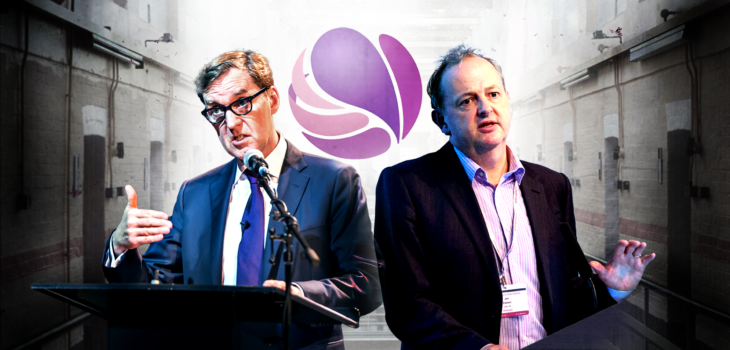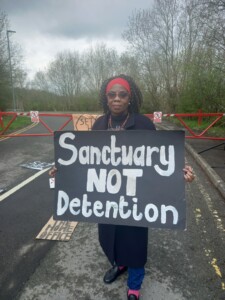Unfit to Practice: Plus Making Billions

[Content warning: suicide]
Corporate Watch investigated Practice Plus Group, a private health company making billions from NHS contracts for healthcare in prisons and immigration detention centres. After examining government contracts and coroner’s reports, we can reveal the company’s troubling record when it comes to its ‘care’ of vulnerable patients.
Practice Plus Group (PPG) claims to be one of the largest independent providers of private, insured, and NHS health services in England. Owned by Bridgepoint – a large private equity firm – PPG has spent over a decade working in healthcare, prisons and immigration detention centres.
In 2023, the latest ‘Illegal’ Migration Act was passed into law, deepening the harmful impact of the ‘hostile environment’ policy for people seeking asylum. The devastating impact for those people effectively leaves them criminalised, forced into dire accommodation and facing huge challenges, from a pitiful income, to issues accessing healthcare and legal support. Routes to the UK have been either criminalised or are inadequate, and immigration detention populations continue to rise as the government promises to lock up more and more people seeking safety. Meanwhile, corporate profits from this unethical system continue to soar.
While investigating, we found:
- Practice Plus Group (PPG) is making billions from healthcare contracts to work with patients in prisons and immigration detention centres across England.
- PPG has a dire track record of patient care across its locked facilities with coroner’s reports detailing horrific, and at times fatal, neglect.
- The health care contract for Derwentside – a women’s immigration detention centre – is run by PPG. Women have spoken out about the inadequate care they received and the culture of disbelief they faced in detention.
- Private equity firm, Bridgepoint, owns the health company. The controversial investment manager is politically well-connected, with at least two of its staff having spent time in senior government trade positions.
Practice Plus Group: No Justice in Health
PPG calls its immigration detention and prison services, ‘Health in Justice’, and claims it’s responsible for 41,000 patients across 45 prisons and immigration centres, with many of its contracts lasting for seven or more years, effectively locking in privatisation. It’s the company’s second most profitable area of work, seeing revenue of £205.4m for 2023, with income steadily rising year on year. Our research found that between 2021 and 2033, PPG will be awarded just over £1bn for prison healthcare. This includes contracts to run prison mental health services.
Meanwhile, PPG’s name appears 29 times on coroner’s reports on avoidable deaths in England since 2020 when it was carved out of Care UK in a restructuring by owners Bridgepoint. Between 2013 and 2018, Care UK appears in a further 15 reports.
One report from 2020 details the death of Dominic Nobel at HMP Leeds. The inquest stated that Nobel did not receive timely mental health support from the company. He reportedly took his own life after a month of waiting to see a psychiatrist. His mother had even contacted the prison to raise concerns about her son’s worrying behaviour and feelings. The inquest reported that if PPG failed to take action, there was a risk of this happening again as the mental health service was inadequate for the prison.
But this wasn’t the first avoidable death at HMP Leeds with PPG in charge. Mohammed Irfaan Afzal died tragically almost exactly a year before Nobel. Within 48 days of being in prison, he’d lost almost a third of his body weight. Even though he was suspected of having a learning disability and mental health issues, he was never seen by a learning disability nurse or given a full mental health assessment. Campaign group and charity, Inquest, detail this and many more atrocities in its report, ‘Deaths of racialised people in prison 2015 – 2022: Challenging racism and discrimination’.
Immigration Detention Centres
Since 2013, NHS England has been responsible for healthcare provision in the country’s immigration detention centres. Although people locked up in these centres are entitled to the same standards of care, and services, that are received in the community, the reality of their experiences tells a different story.
PPG has contracts to provide services at several immigration detention centres in England. This includes mental health, physical health, primary care, dental and substance misuse services. Its current contracts are worth a combined £71m to provide healthcare at Derwentside (a women’s detention centre), Gatwick (Brook House and Tinsley House), and Heathrow detention centres (Colnbrook and Harmondsworth). Like its prison contracts, these run for long periods of time, locking PPG into health work with vulnerable migrants.

photo credit: Women for Refugee Women
After an undercover BBC investigation in 2017 revealed horrific racist abuse experienced by people detained at the Brook House Immigration Removal Centre at the hands of staff, the government opened an inquiry, published in late 2023. This reported major issues facing employees and detained people, mainly a lack of staff and high turnover, with agency workers covering a fifth of shifts during the period examined. This report established that the quality of healthcare was insufficient.
Following this, Medical Justice conducted a further review of the findings and published a damning report in December 2023. This established that clinical safeguards were not functioning properly, mental health assessment and support was inadequate, potentially contributing to high levels of self-harm and suicide risk amongst a population of people who have overwhelmingly experienced torture or human trafficking. It also found that vulnerable people had been put into isolation using unprofessional and unnecessary force which sometimes led to harm. Medical Justice concluded that the changes made by PPG since the government inquiry had not addressed crucial and systemic safeguarding issues.
In another report from 2023, Medical Justice interviewed 66 patients, 55 of whom were held in detention centres where PPG had the healthcare contract. The charity found that almost 50% of people detained did not see a GP in the first 24 hours, despite this being a legal requirement. Of those who did see a GP, almost a third did not have any mental health examination recorded, Overall, there were an extremely low number of safeguarding reports completed given the high number of vulnerable patients, mental health conditions were regularly missed or not explored by healthcare staff at the centres, and the medical charity judged clinical safeguards to be failing.
Derwentside: Huge Profits Made from Pain and Misery
In 2021, Derwentside Immigration and Removal Centre replaced Yarl’s Wood as the main detention centre for women in the UK. Since then, there have been ongoing reports of mental health deterioration and distress from women who have been held there, and protests have targeted the centre due to its inhuman conditions and treatment of vulnerable women. PPG holds the contract for primary and dental care at Derwentside until 2030.
A damning 2022 HMIP inspection report into Derwentside, found that standards of care were insufficient, especially for those at risk of self-harm or suicide. According to the Chief Inspector of Prisons, there’s a risk of ‘real harm’ for the women there if the number of people detained rises.
We spoke to Carenza Arnold, who works with Women for Refugee Women, a grassroots organisation that has long campaigned against corporate profiteering from people’s pain. The End Detention group is part of this organisation – a group of women campaigners with experience of, or at risk of, immigration detention. Arnold shared some of the women’s stories with us:
We came to the UK seeking sanctuary from war, persecution and violence, and instead [in detention] we are ripped from our lives and placed into further torture, with no freedom and no hope. Being locked up in detention made us feel humiliated, rejected and as if we are less than human. Huge profits are being made from our pain and misery by private companies who run detention centres and its facilities on behalf of the Government. No one should be treated as if they are less than someone else.
Arnold shared details of another woman, Anika, who has been waiting two years for a decision on her asylum claim. During this time she was detained for a period of three months and transferred between detention centres across England (Colnbrook, Yarl’s Wood, Manchester short-term holding facility, and Derwentside) over 20 times.
At a medical appointment, she was accused by a doctor within the detention centre of ‘acting’. “I felt so powerless and vulnerable” she explained after the doctor ridiculed her and told her that she could pretend to be sick but would still be deported, so she should ‘get over it’.
This is far from the first report of a culture of disbelief and inadequate healthcare inside immigration detention, especially when it comes to mental health. A 2019 government inquiry included evidence to this effect. In the same year, Bail for Immigration Detainees (BID) reported a similar culture of disrespect, minimising, and a failure amongst medical staff to take health and mental healthcare needs seriously.
Similarly, Arnold told us about Anu, who spoke out about her healthcare experience at Yarl’s Wood:
I became really ill in detention. My haemoglobin level was so low I had to keep having transfusions and I became bed-bound at one point. The Home Office didn’t care; they were still trying to deport me. Things changed when I reached out to a charity for help. They helped me see a doctor who said that my blood level was too low for me to fly so I couldn’t be deported.
In 2017, The British Medical Association (BMA) concluded that it was difficult, potentially impossible, for doctors to do their jobs due to the various policies and procedures in place at the centre. In 2024, the BMA reiterated its call to fully phase out these open-air prisons. Women for Refugee Women urges the government to end immigration altogether and to pursue community-based alternatives. The group emphasises that failure to do so will inevitably cause further harm.

photo credit: Women for Refugee Women – #SetHerFree
Practice Plus: a lucrative asset for private equity

In our previous research into PPG – investigated for its involvement in a shady meeting of top government officials and health companies during the pandemic – we discovered a range of commonplace practices in the NHS. These included:
- So-called ‘horse-trading’ – the rapid rate of buying and selling healthcare assets by corporations that appears to prize short-term profit over stable and sustainable services.
- Increasingly long contracts that lock-in privatisation.
- A pattern of oblique reporting in contracts on government websites.
- A litany of scandals and violations connected to the companies profiting from our health service.
Bridgepoint’s controversies have appeared in several of Corporate Watch’s previous investigations and the firm is politically well-connected. The asset manager has also been condemned in the media for its unusually large ‘golden hello’ entry payments to new directors.
Two standout figures from the leadership team are Dame Carolyn McCall, ITV boss and former director at the Department of Business, Energy and Industrial Strategy, and Archie Norman, also a director at the department, who once spent time as ITV’s chair and is a former Tory MP. Norman co-founded the right-wing think tank Policy Exchange, and was recruited by an ex-McKinsey colleague, William Hague.
In our most recent report mentioning Bridgepoint, we found that between 2013 to 2023, it was awarded healthcare contracts worth a total of £2.4bn, in addition to a share of contracts worth £27.8bn.
Labour: Adding Fuel to the Fire
The increased privatisation of our health service means profits soar while waiting lists continue to grow. A new report by campaign group We Own It revealed that the private sector has raked in £10m in profit per week since 2012 from NHS funds. But the government’s answer to record waiting times and a health service in crisis? More privatisation, outsourcing and public-private partnerships for building hospitals. This is a dangerous ‘remedy’ already proven to lead to avoidable deaths and a decrease in quality of care.
Private companies, with terrible track records for care, are being handed contracts to work with some of society’s most vulnerable patients in care homes, mental health facilities, prisons and locked immigration detention centres. These profit-seeking businesses are being awarded ever-longer contracts with seemingly no regard for the human cost.
At a time when reports reveal an alarming increase in self-harm and the worst conditions ever seen for people locked in immigration detention centres, it’s clear we need a different approach. This is seemingly not something Labour has planned, as it adds fuel to the fire with horrendous anti-immigration rhetoric, plans to increase deportations, and more money pumped into border control.
Kier Starmer’s new government recently promised to lock up even more people inside immigration detention centres. Added to this, prisons are at capacity – in part due to Britain having the highest rate of incarceration in western Europe. Meanwhile, private companies that continue to neglect the mental and physical health of vulnerable patients continue to win contracts worth billions.
But, as Arnold tells us: campaigning works! Whether supporting organisations campaigning against immigration detention and profiteering, or joining localised actions – such as the monthly protests against Derwentside detention centre in County Durham – people are a powerful force to raise awareness about this critical situation and call for radical change.
Ground Floor, 1330 Arlington Business Park, Theale, Reading, England, RG7 4SA
